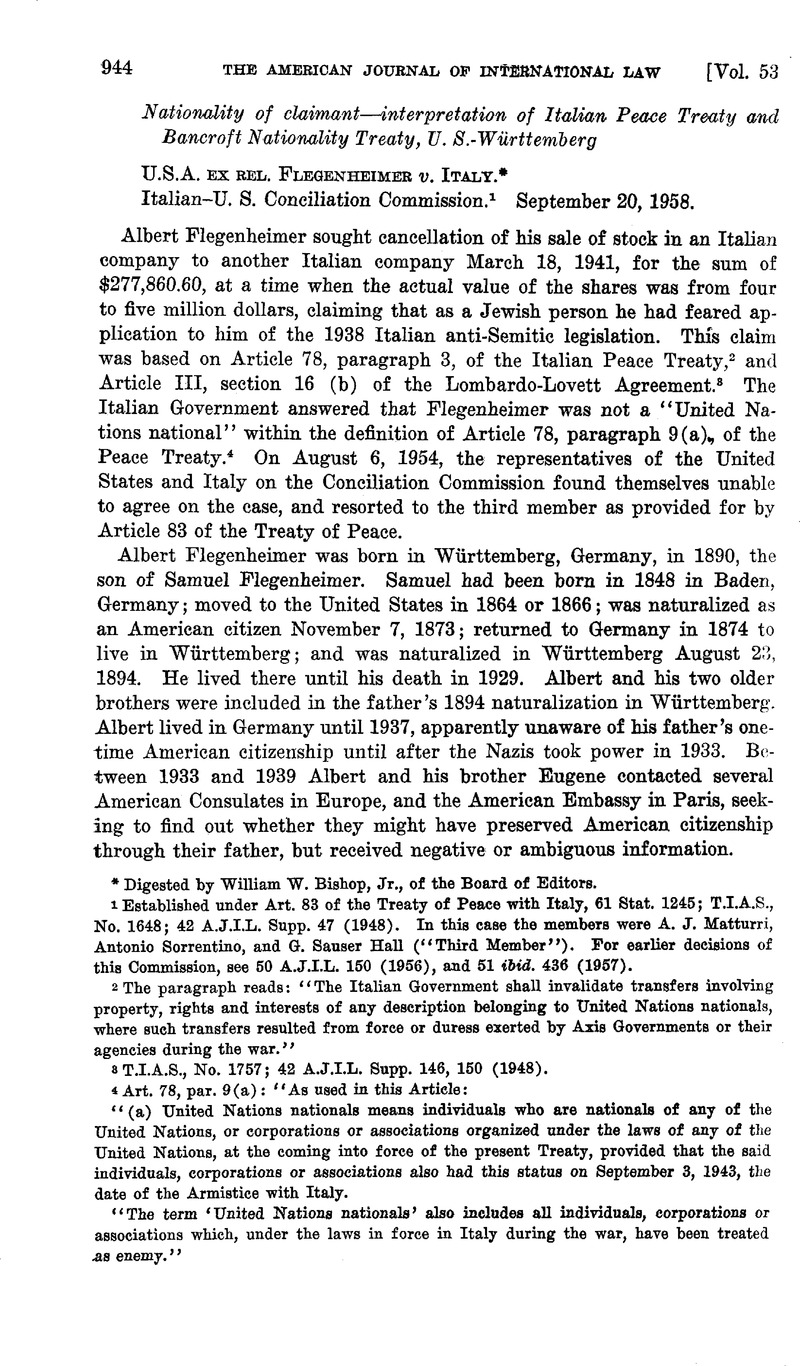
Digested by William W. Bishop, Jr., of the Board of Editors.
1 Established under Art. 83 of the Treaty of Peace with Italy, 61 Stat. 1245; T.I.A.S., No. 1648; 42 A.J.I.L. Supp. 47 (1948). In this ease the members were Matturri, A. J., Sorrentino, Antonio, and Sauser Hall, G. (“Third Member“). For earlier decisions of this Commission, see 50 A.J.I.L. 150 (1956)Google Scholar, and 51 ibid. 436 (1957).
2 The paragraph reads: ‘ ‘ The Italian Government shall invalidate transfers involving property, rights and interests of any description belonging to United Nations nationals, where such transfers resulted from force or duress exerted by Axis Governments or their agencies during the war.''
3 T.I.A.S., No. 1757; 42 A.J.I.L. Supp. 146, 150 (1948).
4 Art. 78, par. 9(a) : “As used in this Article: ” ( a ) United Nations nationals means individuals who are nationals of any of the United Nations, or corporations or associations organized under the laws of any of the United Nations, at the coming into force of the present Treaty, provided that the said individuals, corporations or associations also had this status on September 3, 1943, the date of the Armistice with Italy. “The term ‘United Nations nationals’ also includes all individuals, corporations or associations which, under the laws in force in Italy during the war, have been treated .as enemy.“
5 The Commission stated that ‘ ‘ The dispositions of this decision are adopted by unanimous vote, although on some points of law the Representative of the United States of America is not in agreement.“
6 Sic. It was “new” in the sense of being newly his country of allegiance, but he had been born there and had until then always lived there.
7 Decided Jan. 14, 1930, by the German-Mexican Claims Commission, 1931-1932 Annual Digest, Case 124.
8 Wildermann v. Heritiers Stinnes, German-Kumanian Mixed Arbitral Tribunal, June 9, 1926, 6 Eeeueil des Decisions des Tribunaux Arbitraux Mixtes 485, 493.
9 Decided Oct. 19, 1928, by French-Mexican Claims Commission, 1927-1928 Annual Digest 301.
10 3 Moore's Arbitrations 2592, 2618.
11 Ibid. 2599, 2620.
12 Discussing the Medina case before the TJ. S.-Costa Eican Claims Commission, decided Dec. 31, 1862, 3 Moore's Arbitrations 2587; the Salem case between the United States and Egypt, June 8, 1932, 2 Int. Arb. Awards 1184; the Hatton ease, Sept. 26, 1928, before the U. S.-Mexican General Claims Commission, 4 ibid. 329, Opinions (1928-29), p. 6; Nielsen's opinion in the Naomi Russell case before the Special Claims Commission (V. S.-Mexieo), April 24, 1931, 4 Int. Arb. Awards 805; and the Flutie eases decided by the American-Venezuelan Commission of 1903, Ralston, Venezuelan Arbitrations of 1903, p. 38. The Commission cited several further cases.
13 Citing Hunt's Report of the American and Panamanian General Claims Arbitration under Conventions of 1926 and 1932, pp. 663 and 723; and 3 Moore's Arbitrations 2600.
14 Citing Borchard in 1931 Annuaire de l'Institut de Droit International 277 ( I ); and 2 Hyde, International Law 1130-1131 (2nd ed., 1945).
15 Here the Commission found its conclusion in harmony with that of the Franco-Mexican Commission in the George Pinson case, 5 Int. Arb. Awards 327, 371.
16 1 Malloy 53; Art. IV of this treaty provided: ‘ ‘ The emigrant from the one State who, according to the first article, is to be held as a citizen of the other State, shall not on his return to his original country be constrained to resume his former citizenship; jot if he shall of his own accord reacquire it and renounce the citizenship obtained by naturalization, such a renunciation is allowed, and no fixed period of residence shall be required for the recognition of his recovery of citizenship in his original country.“
17 2 Malloy 1895.
18 307 U. S. 325 (1939); 33 A.J.I.L. 773 (1939).
19 The Commssion discussed Rueff v. Brownell, 116 F. Supp. 298 (D.N.J. 1953), and rejected its applicability to the instant case.
20 Seeking to restrict the theory of the International Court of Justice in the Nottebohm Case, [1955] I.C.J. Rep. 4, 49 A.J.I.L. 396 (1955), the Commission limited the theory of “effective or active nationality” to cases of dual nationality, saying: “There does not in fact exist any criterion of proven effectiveness for disclosing the effectiveness of a bond with a political collectivity, and the persons by the thousands who, because of the facility of travel in the modern world, possess the positive legal nationality of a State, but live in foreign States where they are domiciled and where their family and business center is located, would be exposed to non-recognition, at the international level, of the nationality with which they are undeniably vested by virtue of the laws of their national State, if this doctrine were to be generalized.'' As for “apparent nationality,” the Commission said it “cannot be considered as accepted by the Law of Nations.” Instead, “Barring eases of fraud, negligence or serious errors which are not proved in the instant case, the Commission holds that there is no rule of the Law of Nations, universally recognized in the practice of States, permitting it to recognize a nationality in a person against the provisions of law or treaty stipulations, because nationality is a legal notion which must be based on a state law in order to exist and be productive of effects in international law; a mere appearance cannot replace provisions of positive law governing the conditions under which a nationality is granted or lost, because international law admits that every State has a right, subject to treaty stipulations concluded with other States, to sovereignly decide who are its nationals.“